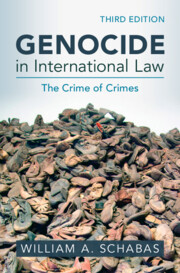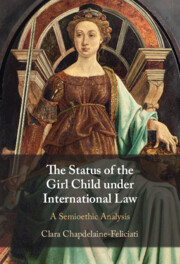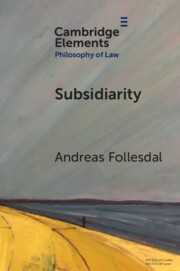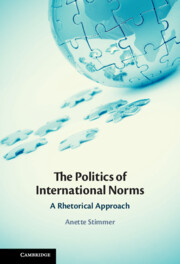1164 results
Introduction
-
- Book:
- Genocide in International Law
- Published online:
- 14 March 2025
- Print publication:
- 03 April 2025, pp 1-13
-
- Chapter
- Export citation
Global Health “With Justice”: The Challenges and Opportunities for Human Rights in Global Health Law
-
- Journal:
- Journal of Law, Medicine & Ethics ,
- Published online by Cambridge University Press:
- 27 March 2025, pp. 1-5
-
- Article
-
- You have access
- Open access
- HTML
- Export citation

Genocide in International Law
- The Crime of Crimes
-
- Published online:
- 14 March 2025
- Print publication:
- 03 April 2025
U.S. Accession to the Law of the Sea Convention? A Challenge for America's Global Leadership
-
- Journal:
- Asia-Pacific Journal / Volume 15 / Issue 13 / July 2017
- Published online by Cambridge University Press:
- 14 March 2025, e1
-
- Article
- Export citation
Was Cambodia's Khmer Rouge Tribunal Worth the Effort? The View of an Anthropological Witness
-
- Journal:
- Asia-Pacific Journal / Volume 21 / Issue 1 / January 2023
- Published online by Cambridge University Press:
- 14 March 2025, e2
-
- Article
- Export citation
International Law Shaping and Digital Ecosystems: Between Sensationalism and Empowerment
-
- Journal:
- Asian Journal of International Law , First View
- Published online by Cambridge University Press:
- 13 March 2025, pp. 1-20
-
- Article
- Export citation

The Status of the Girl Child under International Law
- A Semioethic Analysis
-
- Published online:
- 06 March 2025
- Print publication:
- 13 March 2025
Case Study 3.2 - The Lower Sesan II
- from Section 3 - Infrastructure
-
-
- Book:
- A Casebook on Chinese Outbound Investment
- Published online:
- 28 February 2025
- Print publication:
- 06 March 2025, pp 156-171
-
- Chapter
-
- You have access
- Open access
- HTML
- Export citation
The East Mediterranean Gas Forum as a Platform for a Regional Energy Treaty
-
- Journal:
- Israel Law Review , First View
- Published online by Cambridge University Press:
- 27 February 2025, pp. 1-38
-
- Article
-
- You have access
- Open access
- HTML
- Export citation
Cruise Ships in International Law: Towards a Theory of Legal Infrastructure
-
- Journal:
- German Law Journal / Volume 25 / Issue 8 / November 2024
- Published online by Cambridge University Press:
- 26 February 2025, pp. 1382-1406
-
- Article
-
- You have access
- Open access
- HTML
- Export citation
Legal Infrastructures: Towards a Conceptual Framework
-
- Journal:
- German Law Journal / Volume 25 / Issue 8 / November 2024
- Published online by Cambridge University Press:
- 26 February 2025, pp. 1229-1246
-
- Article
-
- You have access
- Open access
- HTML
- Export citation

Subsidiarity
-
- Published online:
- 20 February 2025
- Print publication:
- 20 February 2025
-
- Element
- Export citation
Introduction
-
- Book:
- The Politics of International Norms
- Published online:
- 07 February 2025
- Print publication:
- 20 February 2025, pp 1-37
-
- Chapter
- Export citation
22 - Utility Models and Innovation in Low-Income Economies
- from Part III - The Future of Sub-patent Innovation Rights
-
-
- Book:
- Sub-patent Innovation Rights
- Published online:
- 06 February 2025
- Print publication:
- 13 February 2025, pp 387-402
-
- Chapter
-
- You have access
- Open access
- HTML
- Export citation

The Politics of International Norms
- A Rhetorical Approach
-
- Published online:
- 07 February 2025
- Print publication:
- 20 February 2025
The Price of Justice: Compliance and Damages Awarded by the Inter-American Court of Human Rights
-
- Journal:
- Journal of Law and Courts ,
- Published online by Cambridge University Press:
- 17 January 2025, pp. 1-24
-
- Article
-
- You have access
- Open access
- HTML
- Export citation
1 - The Rule of Law under Pressure
- from Part I - Introduction: Concepts and Empirics
-
-
- Book:
- The Rule of Law under Pressure
- Published online:
- 02 January 2025
- Print publication:
- 16 January 2025, pp 3-86
-
- Chapter
-
- You have access
- Open access
- HTML
- Export citation
2 - Why Sovereigns Are Entitled to (Horizontal) Benefits of the International Rule of Law
- from Part I - Introduction: Concepts and Empirics
-
-
- Book:
- The Rule of Law under Pressure
- Published online:
- 02 January 2025
- Print publication:
- 16 January 2025, pp 87-110
-
- Chapter
-
- You have access
- Open access
- HTML
- Export citation
4 - International Organizations as Constitution-Shapers
- from Part II - International Organizations and Transnational Legal Ordering of the Rule of Law
-
-
- Book:
- The Rule of Law under Pressure
- Published online:
- 02 January 2025
- Print publication:
- 16 January 2025, pp 153-181
-
- Chapter
-
- You have access
- Open access
- HTML
- Export citation
Between Rules and Implementation: The Difficulty in Relying on International Law in Military Courts in Criminal Law
-
- Journal:
- Israel Law Review , First View
- Published online by Cambridge University Press:
- 15 January 2025, pp. 1-29
-
- Article
-
- You have access
- Open access
- HTML
- Export citation


